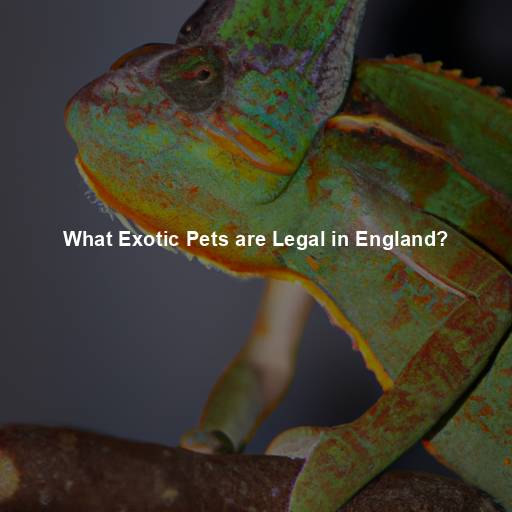Exotic Pets: Unraveling the Fascination and Challenges
Last Updated on November 20, 2023 by Evan
Contents [hide]
- 0.1 to Ecological Concerns
- 0.2 Habitat Destruction and Loss
- 0.3 Endangerment of Species
- 0.4 Invasive Species and Ecological Imbalance
- 0.5 Responsible Exotic Pet Ownership and Conservation
- 0.6 Supporting Conservation Organizations
- 0.7 Educating Others and Raising Awareness
- 0.8 Promoting Sustainable Alternatives
- 0.9 Understanding Ethical Concerns
- 0.10 Captive Breeding vs. Wild Capture
- 0.11 Welfare and Quality of Life
- 0.12 Education and Public Perception
- 0.13 Conservation and Wild Populations
- 1 The Role of Regulation in Exotic Pet Ownership
- 2 Striking a Balance: Responsible Exotic Pet Ownership
- 3 FAQs – What do you mean by exotic pets?
- 3.1 What are exotic pets?
- 3.2 What makes a pet exotic?
- 3.3 Why do people choose exotic pets?
- 3.4 What are the challenges of owning an exotic pet?
- 3.5 Are exotic pets legal to own?
- 3.6 What should potential exotic pet owners consider before getting one?
- 3.7 Where can I find reputable information about exotic pets?
to Ecological Concerns
While the allure of exotic pets is undeniable, it is crucial to acknowledge the potential ecological impact associated with their ownership. Exotic pet trade, when not properly regulated, can lead to various ecological issues, including habitat destruction, species endangerment, and the spread of invasive species.
Habitat Destruction and Loss
The demand for exotic pets often leads to habitat destruction and loss, as natural habitats are exploited to meet the growing market’s needs. Deforestation, mining, and urbanization are some of the activities that can devastate the ecosystems where these unique animals originate. By purchasing exotic pets without considering the ecological consequences, individuals inadvertently contribute to the destruction of fragile habitats and the displacement of native species.
Endangerment of Species
In the captivating world of wildlife, a somewhat perplexing reality lingers beneath the surface. The trade that brings exotic pets into our lives can unknowingly unleash a torrent of unpredictable consequences for vulnerable species. As these magnificent creatures are captured and plucked from their natural habitats, a delicate balance is disturbed. The disruption of breeding patterns, dwindling populations, and the ominous shadow of extinction loom ever closer.
Invasive Species and Ecological Imbalance
One of the most significant concerns associated with exotic pets is the potential introduction of invasive species into new environments. When exotic pets are released or escape into the wild, they can establish breeding populations and compete with native species for resources. Invasive species can outcompete native species, disrupt ecosystems, and cause significant ecological imbalances. This can result in the decline or extinction of native flora and fauna, disrupting the delicate balance of ecosystems.
Responsible Exotic Pet Ownership and Conservation
As we navigate the complex world of pet ownership, one cannot help but ponder whether responsible exotic companionship is indeed a piece of the elusive puzzle known as conservation. The enchanting allure of exotic pets beckons, charming us with their vibrant colors and enigmatic behaviors. However, it is through embracing ethical practices and championing the cause of conservation that we can hope to unravel the intricate tapestry that binds us to the delicate balance of our natural world. By treading this enigmatic path with mindful dedication, we anoint ourselves as stewards of biodiversity, safeguarding the intricate ecosystems that these enigmatic creatures call home.
Supporting Conservation Organizations
One way to make a difference is by supporting reputable conservation organizations dedicated to preserving habitats and protecting endangered species. These organizations work tirelessly to conserve biodiversity, conduct research, and implement conservation strategies. By contributing to their efforts through donations or volunteer work, exotic pet owners can actively participate in conservation and help mitigate the negative effects of the exotic pet trade.
Educating Others and Raising Awareness
Owning exotic pets is not just about having an intriguing companion; it’s also a chance to become a catalyst for change. As exotic pet owners, we hold the power to enlighten the masses about the responsibilities that come with this unique privilege and the pressing need for conservation. Through sharing our personal encounters, wisdom, and anecdotes, we can ignite a flame of awareness regarding the ecological repercussions of the exotic pet trade and foster informed decision-making. By mobilizing others to back conservation initiatives and embracing sustainable practices, we can usher in a new era of responsible and environmentally-conscious exotic pet ownership.
Promoting Sustainable Alternatives
In some cases, promoting sustainable alternatives to owning exotic pets may be the most responsible choice. Instead of owning exotic animals as pets, individuals can consider supporting ecotourism initiatives that allow for responsible wildlife encounters in their natural habitats. These experiences provide an opportunity to appreciate and learn about exotic animals while supporting local economies and conservation efforts.
Understanding Ethical Concerns
While the appeal of exotic pets is undeniable, it is important to explore the ethical considerations tied to their ownership. Ethical concerns arise regarding the capture, breeding, and treatment of these animals, as well as the impact on their wild populations and the potential for exploitation.
Captive Breeding vs. Wild Capture
Ethical debates surround the methods used to acquire exotic pets. Captive breeding programs, when conducted responsibly, can help decrease the demand for wild-caught animals and contribute to species conservation. However, unethical breeding practices, such as excessive inbreeding or poor living conditions, can lead to health issues and compromised welfare. The trade in wild-caught animals, on the other hand, raises concerns about the impact on wild populations and the potential for unsustainable practices.
Welfare and Quality of Life
When it comes to exotic pets, ensuring their well-being and quality of life becomes a perplexing ethical puzzle. These fascinating creatures come with intricate social dynamics, environmental requirements, and specific dietary needs that pose a burst of challenges for domestic settings. From demanding spacious habitats to specialized diets and crucial social interactions, it’s a complex jigsaw puzzle to determine if a regular household environment can truly cater to their needs. Hence, a thorough evaluation of the captivity conditions becomes paramount to guarantee a suitable and enriching existence for these extraordinary animals.
Education and Public Perception
Ethical exotic pet ownership also involves educating the public about the responsibilities and challenges associated with caring for these animals. Dispelling misconceptions and promoting a better understanding of the specific needs of exotic pets can help prevent impulse purchases and ensure that potential owners are well-informed before making a commitment. Education plays a crucial role in fostering responsible ownership and raising awareness of the ethical considerations involved.
Conservation and Wild Populations
Exotic pet ownership has ignited a fiery debate, causing ethical dilemmas to blaze as bright as the tropical sun. The allure of these unique creatures, however, comes with a storm of uncertainty. The demand for such exotic companions can unleash a torrent of illegal wildlife trafficking, causing vulnerable populations to teeter on the edge of extinction. To navigate this perplexing maze, it becomes crucial to unravel the conservation status of these species and decipher if welcoming them into our homes as pets might unwittingly thrust their wild brethren into deeper peril.
The Role of Regulation in Exotic Pet Ownership
The Need for Regulation
In the realm of exotic pet ownership, a myriad of swirling ethical, ecological, and welfare concerns entangle enthusiasts and skeptics alike. Nestled within this perplexing web of complexities lies the pressing need for effective regulation. Through a delicate balancing act, such regulations could potentially weave together the threads of animal welfare, the preservation of wild populations, and the prevention of the exploitation of vulnerable species. Solving this intricate puzzle could ultimately pave the path towards harmonious coexistence between humans and their most unconventional companions.
Permit Requirements and Restrictions
Regulation often involves permit requirements and restrictions on the ownership of certain exotic species. These measures aim to control the trade and possession of animals that may pose a risk to public safety, have specific conservation concerns, or require specialized care. By enforcing permit systems, authorities can monitor and assess the suitability of individuals to own exotic pets, promoting responsible ownership and mitigating potential risks.
Licensing and Accreditation of Sellers
In a world where the trade of exotic pets can sometimes be as mysterious as a hidden treasure, regulations step in like enigmatic guardians protecting the welfare of these extraordinary creatures. These enigmatic keepers oversee a labyrinth of licensing and accreditation requirements, ensuring that only the most reputable sellers and breeders take part in this specialized world. Mystifying as it may seem, these systems aim to bring transparency and guard the essence of animal well-being while honoring the importance of species conservation.
Education and Awareness Campaigns
Regulation should be accompanied by education and awareness campaigns to inform the public about the legal requirements and ethical considerations associated with exotic pet ownership. These campaigns can help potential owners make informed decisions, understand the responsibilities involved, and ensure that they have the necessary resources and knowledge to provide appropriate care for their pets.
Collaboration with Conservation Organizations
In a world where regulations and conservation efforts intertwine, a harmonious partnership between regulatory bodies and conservation organizations emerges as a beacon of hope for species preservation. By joining forces, these entities have the power to create regulations that not only safeguard biodiversity but also nurture responsible exotic pet ownership. Through this collaboration, they can pave the way towards a future where animal welfare takes center stage, contributing to the greater cause of protecting wild populations.
International Cooperation and Wildlife Trade Monitoring
Given the global nature of the exotic pet trade, international cooperation is essential in regulating and monitoring the trade. Collaboration between countries can help combat illegal wildlife trafficking, ensure the ethical treatment of animals, and promote conservation efforts. Agreements, such as the Convention on International Trade in Endangered Species of Wild Fauna and Flora (CITES), facilitate cooperation and provide a framework for regulating the international trade of exotic species.
Striking a Balance: Responsible Exotic Pet Ownership
In the world of exotic pet ownership, the line between right and wrong can be quite blurry. But amidst the ethical concerns and calls for regulation, there exists a glimmer of hope – a flicker of responsibility. It’s a delicate dance between our fascination with these extraordinary creatures and our obligation to nurture their well-being, preserve their wild brethren, and tread lightly on the fragile ecological tapestry. By embracing ethical practices, championing conservation efforts, and heeding the guiding light of regulatory guidelines, we may just find the elusive harmony we seek.
Responsible exotic pet ownership involves thorough research, understanding the specific needs of the species, providing suitable environments, and prioritizing the well-being of the animals. It also requires ongoing education, supporting conservation efforts, and respecting the ethical considerations associated with the trade and ownership of exotic pets.
By embracing responsible ownership practices, we can appreciate the beauty and diversity of exotic animals while actively contributing to their conservation and welfare. Let us strive to be informed, compassionate, and responsible caretakers, ensuring that our passion for exotic pets aligns with our commitment to the well-being of these extraordinary creatures and the preservation of their natural habitats.
FAQs – What do you mean by exotic pets?
What are exotic pets?
Exotic pets refer to any non-traditional or non-native animal species that are kept as pets. These animals are not typically seen in domestic households and can include reptiles, amphibians, birds, fish, small mammals, and even some species of insects.
What makes a pet exotic?
Discover the unpredictable allure of exotic pets! These captivating creatures stand out from the crowd, boasting rare qualities, jaw-dropping appearances, or awe-inspiring habitats. Delight in the enchanting appeal of these uncommon companions, as they offer a truly one-of-a-kind bond and an exhilarating journey. But tread carefully, for the definition of exotic can also be entangled in a web of bewildering legalities, with some locales raising red flags about the environmental impact these extraordinary animals may have.
Why do people choose exotic pets?
People choose exotic pets for various reasons. Some individuals are fascinated by exotic animals and find joy in observing their unique behaviors and appearance. Others may enjoy the challenge of caring for a different type of pet or the opportunity to educate others about these animals. However, it is crucial to note that owning an exotic pet requires significant research, preparation, and commitment to ensure their well-being.
What are the challenges of owning an exotic pet?
When it comes to delving into the world of exotic pets, one must brace themselves for a whirlwind of unique challenges that differ from the routine pet-owning experience. From creating intricately designed habitats to catering to their peculiar dietary needs, the level of complexity and time commitment soar to uncharted heights. Brace yourself for a lifelong commitment, as some exotic pets grace us with their exceptional presence for a longer period than our conventional furry friends. However, navigating the perplexing maze of finding knowledgeable veterinarians specializing in exotic animals may leave you scratching your head due to their limited availability.
Are exotic pets legal to own?
The world of exotic pets is a tapestry of perplexing regulations and unorthodox restrictions. As one traverses the diverse landscapes of various regions and countries, the legality of owning these extraordinary creatures becomes a tantalizing enigma. From the majestic realms of permits and licenses to the intricate maze of guidelines, each jurisdiction crafts its own intricate web of rules, determining the species that can be embraced as beloved companions or banished to the realms of prohibition. If one harbors dreams of embracing these charismatic creatures, delving into the depths of research and comprehending the legal requirements is an imperative first step in this enigmatic journey.
What should potential exotic pet owners consider before getting one?
Owning an exotic pet is a decision that requires more than just a passing thought. The journey into the realm of exotic pets is filled with twists and turns, leaving potential owners pondering the perplexities that lie ahead. Extensive research is the kaleidoscope through which one can gain insight into the intricate tapestry of care requirements, behavioral intricacies, and potential challenges linked to a specific exotic companion. One must navigate the labyrinth of finding specialized veterinarians, procuring a sustainable supply of specialized food and supplies, and must never underestimate the financial commitment and lifelong commitment essential for the well-being of these extraordinary beings.
Where can I find reputable information about exotic pets?
If you’re venturing into the wild world of exotic pets, you’ll need a compass to navigate the maze of information out there. Look for trustworthy resources, like books that have stood the test of time, online hubs that aren’t a breeding ground for fake news, scientific journals that make you feel like a genius, and organizations that eat, sleep, and breathe exotic pet care. But don’t stop there – tap into the knowledge of seasoned exotic pet owners, veterinarians who know their way around a leopard gecko, or join local clubs where passionate enthusiasts gather to swap tales and tips. Just remember to wear your skeptic hat and dig deeper by cross-checking advice from multiple reliable sources.







